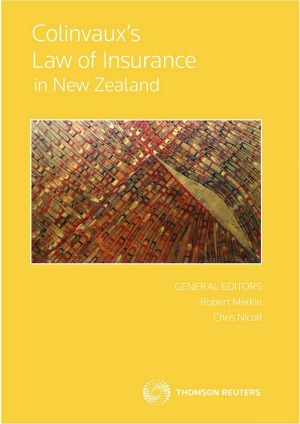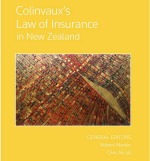Changes to insurance law in New Zealand
It's been 22 years since the first major work on New Zealand's insurance laws was published and due to significant changes, particularly in recent years, the need for an up to date authoritative reference source has become increasingly pressing.
The forthcoming publication of Colinvaux's Law of Insurance in New Zealand by the world renowned authority on insurance law Robert Merkin and his colleague Chris Nicoll, specifically addresses the issues made apparent in the aftermath of the the Christchurch earthquakes.
To find out more about the back ground to the text and its author we talked to Robert Merkin.
(The questions we asked him are in bold font. His answers are below.)
Why does New Zealand need specialist advice on insurance law?
[caption id="attachment_6498" align="alignright" width="300"] Out in November. Click the cover to pre-order now.[/caption]
Out in November. Click the cover to pre-order now.[/caption]
There has not been a book dedicated to New Zealand insurance law since 1992, but the subject is of pervasive importance to New Zealand practitioners, and the number of both undergraduate and post graduate courses on the subject is increasing. A new text was needed because there have been huge developments in the law in New Zealand as well as in the United Kingdom and Australia; the jurisdictions NZ derives much guidance from.
What have been the “game changing” events forcing a review of New Zealand insurance law?
The changes were precipitated by two major events.
The first was the Global Financial Crisis and the need for a thorough review of the regulatory structures affecting insurers, which occurred in 2010.
The second was the Canterbury earthquakes of 2010 and 2011, which has led to some 350,000 insurance claims. The earthquakes has brought into sharp focus the operation of the Earthquake Commission (EQC), and it has also raised a number of crucial points of law – in particular relating to the measure of indemnity for lost or damaged property – which have not arisen elsewhere in the common law world. So New Zealand has become a leading centre for the development of the common law since 2011.
Looking back on those events – were the rights of a) the insurance company or b) the insured compromised? If so, how?
Most of the claims were settled, but many were litigated and important cases remain outstanding at time of writing.
What is the current state of play? If there were another major natural disaster what would happen to a) the insurance companies or b) the insured?
Lessons have been learned. Many insurers have altered their wordings to deal with the unprecedented events of 2010 and 2011. As a result disputes between insurers, the EQC and customers may in the future be averted.
What do you see as the way forward for the EQC, our government, insurance companies, and their customers?
The EQC structure, devised in the United Kingdom for wartime conditions 70 years ago and subsequently adopted in a modified form by NZ, is somewhat creaky and has proved to be unfit for dealing with the issues arising from a major natural catastrophe. A thorough review is underway and it is unlikely that the system will survive unscathed. The conduct of insurers in handling claims has also been subject to a good deal of criticism, some justified and some unjustified, but it is likely that at some point in the future attention will turn to whether there should be reform. If so, should such reform be legislative or self-regulatory (perhaps backed with statutory enforcement), and should it be limited to consumers? These are issues that we can expect to be debated once the earthquake litigation has settled down.
About Robert Merkin and his specialty
It's always interesting to find out a little more about the person behind the text. What sparked their interest in the field? What advice do they have for younger lawyers?
Our questions are shown in bold. Professor Merkin's answers are below them.

Why choose insurance as your field of expertise?
I studied the subject at postgraduate level (by accident, as the subject that I wanted to study was unavailable for timetabling reasons) and discovered a wealth of complex and fascinating law that had seemingly bypassed academic attention. It was an open field.
Did you plan the path to your current position as an international expert?
No. I just started to write about the subject in England, and found fascinating comparisons in other jurisdictions. As there was little competition in terms of commercial insurance scholarship, and in particular reinsurance, I found myself in increasing demand at conferences and for giving advice. There was no plan. I was just in the right place at the right time!
Do you have any career pathway advice for younger lawyers aspiring to emulate your success?
In terms of academic careers, there is so much material to research, and so much is still unknown or taken for granted by textbooks which does not necessarily reflect either the law or its practice. In terms of practitioners, insurance is a great area to specialize in. The issues which arise are fascinating, but it is important to remember that insurance is a specific form of contract. A thorough understanding of contract law is essential to success in this field.
More about Professor Robert Merkin
- International Authority on insurance law joins DLA Phillips Fox as consultant
- Auckland University Business school - Honorary Professor of Law
- Exeter University United Kingdom - Lloyd's Professor of Commercial Law
More about co-author Chris Nicoll
Find out more: Colinvaux's Law of Insurance in New Zealand
Visit our e-store to download a sample chapter.
